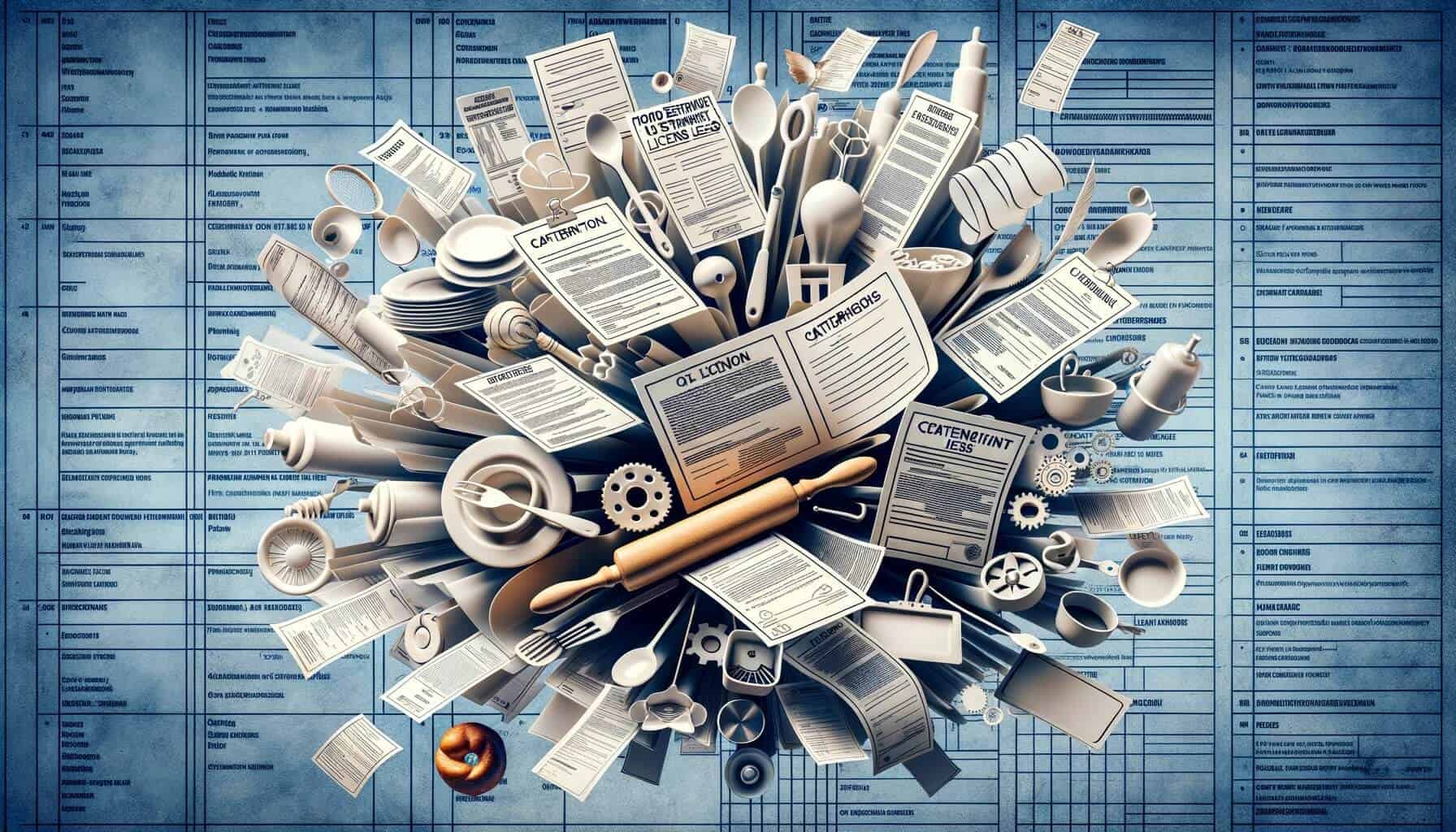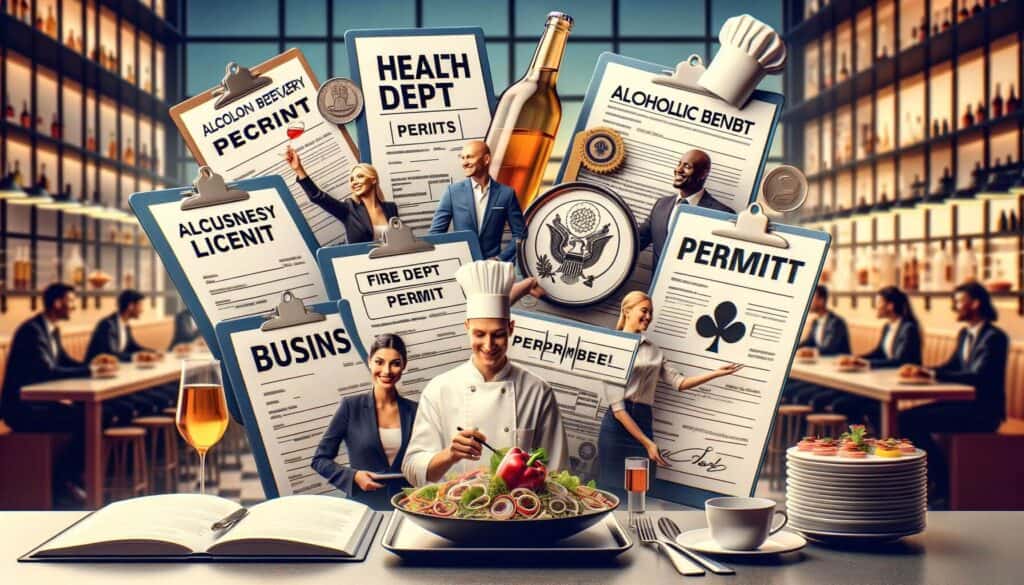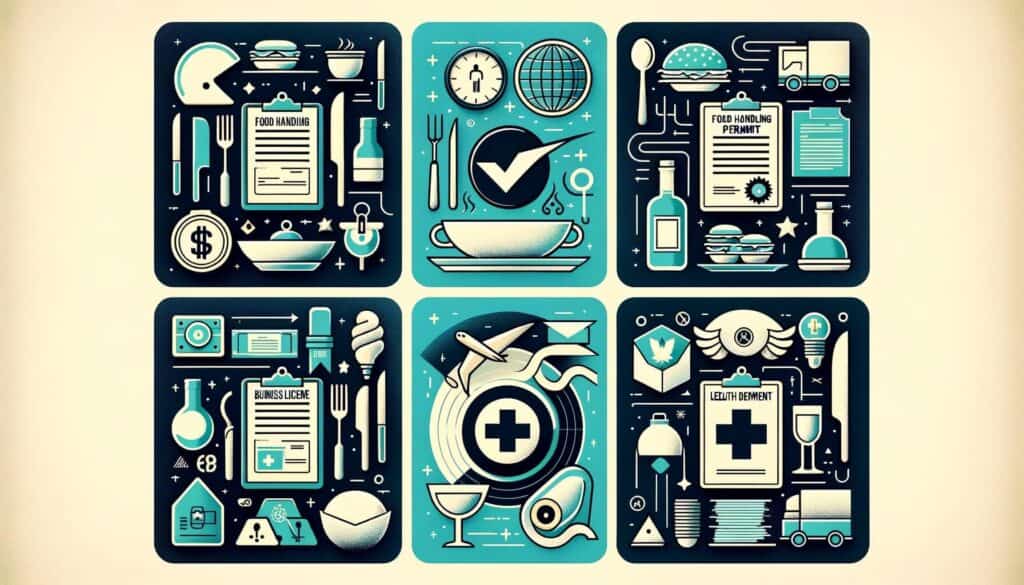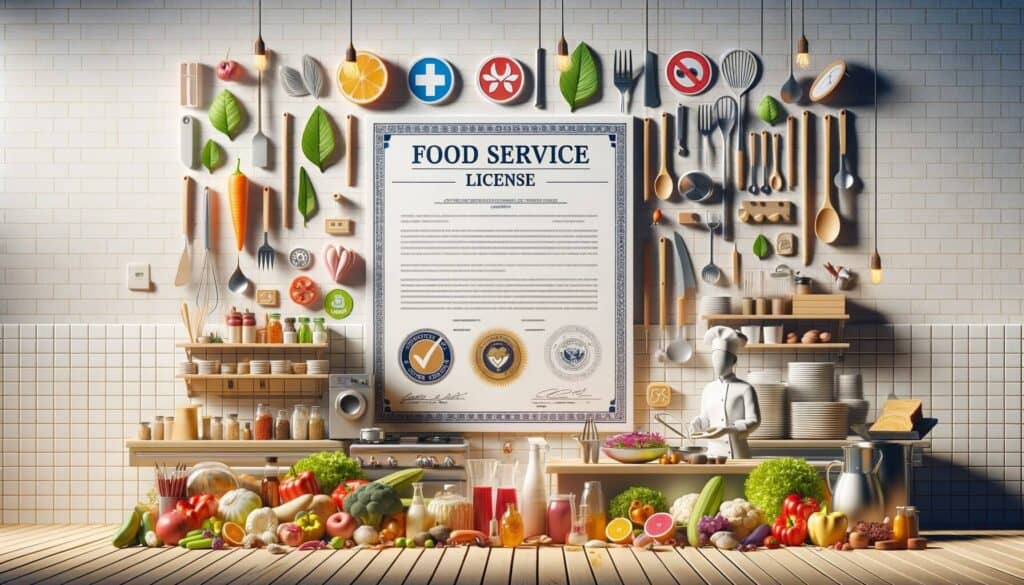
By Jermaine Thomas December 6, 2024
Starting a catering business can be an exciting venture, but it also comes with a host of responsibilities. One of the most crucial aspects of running a successful catering business is obtaining the necessary licenses and permits. These licenses and permits are not only legal requirements but also ensure that your business operates in compliance with health and safety regulations, protects your customers, and minimizes potential risks.
In this comprehensive guide, we will explore the essential licenses and permits needed for a catering business, providing you with everything you need to know to navigate the complex world of regulations and ensure the smooth operation of your business.
What Are Licenses and Permits for a Catering Business?

Licenses and permits are official approvals from regulatory authorities that allow businesses to operate legally. In the catering industry, these documents cover a wide range of areas, including food safety, health, and business operations. Without the proper licenses and permits, your catering business could face fines, penalties, or even closure.
Types of Licenses and Permits Required for a Catering Business

Running a catering business involves various activities, from preparing and serving food to managing events and handling alcohol. To ensure compliance with regulations and legal requirements, it is essential to obtain the following licenses and permits:
1. Food Service License: Ensuring Compliance with Health and Safety Regulations

One of the primary licenses required for a catering business is a food service license. This license is essential as it ensures that your business complies with health and safety regulations related to food handling, preparation, and storage. Obtaining a food service license involves meeting specific requirements set by the local health department, such as having a properly equipped kitchen, maintaining proper hygiene and sanitation practices, and implementing food safety protocols. Failure to obtain a food service license can result in fines, closure of your business, or even legal action if customers fall ill due to foodborne illnesses.
To obtain a food service license, you will need to submit an application to the local health department, undergo an inspection of your catering facility, and provide documentation demonstrating your compliance with health and safety regulations. It is crucial to familiarize yourself with the specific requirements of your local health department and ensure that your catering business meets all the necessary criteria.
2. Alcohol License: Serving Alcoholic Beverages at Catered Events

If your catering business plans to serve alcoholic beverages at events, you will need to obtain an alcohol license. The requirements for obtaining an alcohol license vary depending on the jurisdiction, but generally involve completing an application, paying a fee, and meeting certain criteria, such as being of legal drinking age, having a clean criminal record, and demonstrating knowledge of responsible alcohol service.
It is important to note that serving alcohol comes with additional responsibilities and liabilities. As a caterer, you must ensure that you comply with all laws and regulations related to alcohol service, such as checking IDs, preventing underage drinking, and monitoring alcohol consumption to prevent over-intoxication. Failure to do so can result in legal consequences, including fines, loss of your alcohol license, or even criminal charges if someone is harmed as a result of alcohol consumption at your event.
3. Business License: Registering Your Catering Business with the Local Authorities
In addition to specific licenses related to food service and alcohol, you will also need to obtain a general business license for your catering business. This license is required to legally operate any type of business and is typically obtained from the local government or municipality. The process of obtaining a business license involves registering your business, paying a fee, and providing information about your business structure, location, and operations.
Obtaining a business license not only ensures that your catering business operates legally but also allows you to access certain benefits and protections. For example, having a business license may make you eligible for tax deductions, grants, or loans, and can also provide credibility and trustworthiness to potential clients and customers.
4. Fire Safety Permit: Ensuring Safety Measures in Your Catering Facility
Fire safety is a critical aspect of running a catering business, as the nature of the industry involves working with open flames, hot equipment, and flammable materials. To ensure the safety of your employees, customers, and property, you will need to obtain a fire safety permit. This permit is issued by the local fire department and involves an inspection of your catering facility to ensure compliance with fire safety regulations.
During the inspection, the fire department will assess various aspects of your facility, such as the presence and functionality of fire extinguishers, emergency exits, fire alarms, and sprinkler systems. They will also evaluate your fire prevention and evacuation plans to ensure that you have adequate measures in place to respond to emergencies. Obtaining a fire safety permit is crucial not only for the safety of your business but also to comply with local regulations and avoid penalties or closure in the event of non-compliance.
5. Zoning Permit: Complying with Local Zoning Regulations for Your Catering Business
Before starting a catering business, it is important to ensure that your chosen location is zoned for commercial use. Zoning regulations dictate how land and buildings can be used within a specific area and are enforced by local government authorities. Operating a catering business in a location that is not zoned for commercial use can result in fines, closure of your business, or legal action.
To comply with zoning regulations, you will need to obtain a zoning permit. This permit is typically obtained from the local planning or zoning department and involves submitting an application, paying a fee, and providing information about your business activities and the location where you plan to operate. The zoning department will review your application to ensure that your catering business aligns with the permitted uses for the specific zone and that it does not pose any negative impacts on the surrounding area.
6. Health Department Permit: Maintaining Hygiene and Sanitation Standards
In addition to the food service license mentioned earlier, you may also need to obtain a separate health department permit. This permit is specific to the catering industry and focuses on maintaining hygiene and sanitation standards in your catering facility. The requirements for obtaining a health department permit may vary depending on the jurisdiction, but typically involve meeting certain criteria related to food handling, storage, and preparation.
To obtain a health department permit, you will need to undergo an inspection of your catering facility, demonstrate proper food handling practices, and provide documentation of your compliance with health and safety regulations. This permit ensures that your catering business maintains high standards of cleanliness and food safety, protecting your customers from potential health risks and ensuring the reputation and success of your business.
7. Special Event Permit: Catering at Outdoor or Temporary Locations
If your catering business plans to cater at outdoor events, festivals, or temporary locations, you may need to obtain a special event permit. This permit allows you to legally operate at these locations and ensures that you comply with any additional regulations or requirements specific to the event or venue.
The process of obtaining a special event permit involves submitting an application to the event organizer or the local government, paying a fee, and providing information about your catering business and the specific event or location where you plan to operate. The event organizer or local government will review your application to ensure that you meet all the necessary criteria and that your catering services align with the goals and regulations of the event.
8. Insurance Coverage: Protecting Your Catering Business from Potential Risks
Obtaining insurance coverage is essential for protecting your catering business from potential risks and liabilities. While not a license or permit, insurance coverage is a crucial aspect of running a successful catering business. It provides financial protection in the event of accidents, property damage, or lawsuits.
There are several types of insurance coverage that catering businesses should consider, including general liability insurance, property insurance, and workers’ compensation insurance. General liability insurance protects your business from third-party claims, such as slip and fall accidents or foodborne illnesses. Property insurance covers damage to your business property, equipment, and inventory. Workers’ compensation insurance provides coverage for your employees in the event of work-related injuries or illnesses.
Obtaining the necessary licenses and permits for your catering business is not only a legal requirement but also a crucial step in ensuring the success and reputation of your business. By complying with health and safety regulations, maintaining proper hygiene standards, and protecting your business from potential risks, you can provide your clients with the highest quality service and build a strong foundation for your catering business.
FAQs
Q1. What happens if I operate a catering business without the necessary licenses and permits?
Operating a catering business without the necessary licenses and permits can have severe consequences. Depending on the jurisdiction, you may face fines, closure of your business, or even legal action. Additionally, operating without proper licenses and permits can damage your reputation and credibility, making it difficult to attract clients and grow your business.
Q2. How do I determine the specific licenses and permits required for my catering business?
The specific licenses and permits required for a catering business can vary depending on the location and the nature of your operations. It is crucial to research the regulations and requirements set by the local authorities, including the health department, fire department, and zoning department. Consulting with professionals in the industry, such as lawyers or business consultants, can also provide valuable guidance in determining the necessary licenses and permits for your specific business.
Q3. How long does it take to obtain the necessary licenses and permits for a catering business?
The time it takes to obtain the necessary licenses and permits for a catering business can vary depending on several factors, including the jurisdiction and the complexity of the application process. It is advisable to start the application process well in advance to allow for any potential delays or additional requirements. Some licenses and permits may require inspections or background checks, which can further extend the processing time.
Q4. Can I operate a catering business from my home kitchen?
In some jurisdictions, it may be possible to operate a catering business from a home kitchen, but this typically requires additional permits and inspections. Home-based catering businesses must comply with specific regulations related to food handling, storage, and preparation. It is essential to consult with the local health department and zoning department to determine the feasibility and requirements for operating a catering business from a home kitchen.
Q5. Do I need a separate license to serve food at off-site events?
If your catering business plans to serve food at off-site events, such as weddings or corporate functions, you may need to obtain additional permits or licenses. These permits typically cover aspects such as transportation of food, temporary food service, and compliance with health and safety regulations at the event location. It is crucial to research and obtain the necessary permits in advance to ensure compliance and avoid any legal issues.
Conclusion
Obtaining the necessary licenses and permits is a critical step in starting and operating a successful catering business. These licenses and permits ensure compliance with health, safety, and other regulations, protecting your business, employees, and customers. From food service licenses to alcohol licenses, business licenses to fire safety permits, each license and permit plays a crucial role in maintaining the legality and credibility of your catering business. By understanding the importance of these licenses and permits and ensuring compliance, you can set your catering business up for long-term success.